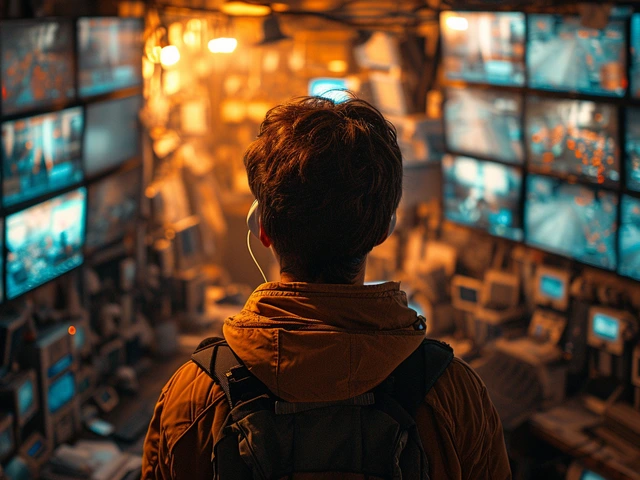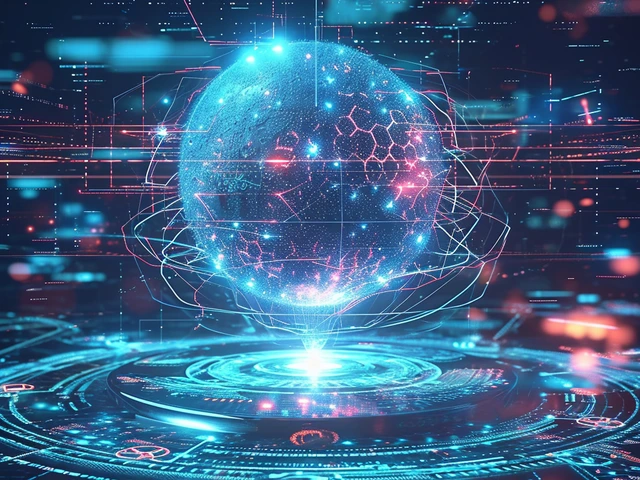Understanding the ChatGPT Phenomenon
Have you heard the buzz about ChatGPT and thought, "What in the world is that?" Well, pull up a chair, and let’s chat about this virtual chatterbox that's been taking the content creation scene by storm. ChatGPT is essentially a nifty tool from the tech wizards at OpenAI that's designed to understand and generate text conversattionally. Imagine having a typewriter that's not only super-smart but can also chat away like your bestie!
Now, I can tell you, as a parent to Aria and Felix who are already whizzes on their tablets, technology moves at the speed of a toddler heading straight for a mud puddle! But this isn't just about speed; it's about how natural and "human" the text feels. Picture this: you ask ChatGPT to write you a poem about lasagna, and bam! You’ve got a sonnet that'll make you crave that cheesy goodness like there's no tomorrow. It's like having a tiny Shakespeare in your computer waiting to serve up words on a silver platter!
And how does this magic happen? Thanks to something called machine learning, which is just a fancy term for a computer learning stuff by gobbling up tons of examples and figuring out patterns. It's a bit like how I learned to make my mom's secret-recipe cookies - by watching and doing it over and over until I got it just right (though my waistline isn't as thrilled about it).
This technology is not only cool but also quite practical, especially if you're in the business of words. Bloggers, marketers, even educators are peeking over the fence to see if the grass is indeed greener with an AI companion like ChatGPT. So buckle up as we dive deeper into this landscape!
How ChatGPT is Shaping Online Content
Creating content online has always been akin to feeding a never-sleeping beast. It's voracious! But with ChatGPT, it's like someone handed us a spoon big enough for the job. This tool can churn out articles, social media posts, marketing copy, and even help you brainstorm ideas. Why, it's so clever; it could probably come up with a better metaphor than the big spoon one!
My personal experience with content creation has been, let's say, diverse. One day, you're writing about the top ten ways to repurpose your old jeans, and the next you're deep-diving into the environmental impact of bubble gum. But the constant need for new, engaging content is exhausting. Insert ChatGPT, and you've got yourself a creative partner that never hits a writer's block or asks for coffee breaks.
I remember the first time I used ChatGPT to flesh out some ideas for a blog post. I sat there, typing away, half-expecting the AI to say, "I’m sorry, Sophie, I can't do that." But there I was, giggling at how it sassed me with witty titles and puns. My kids, Aria, and Felix, thought I had finally lost it, laughing at my laptop screen. But it wasn't just the humor that got me; it was the sheer potential for creators to scale their efforts and consistently deliver quality, engaging content to their audiences.
You might think this sounds too good to be true, or maybe you're skeptical about AI-generated content. Trust me, as someone who was once convinced that "floppy disks" would forever be the pinnacle of technology, my skepticism was as big as Felix's when I tried convincing him that broccoli is a treat. But when you start seeing the efficiency and relevancy in the content it generates, the haze of doubt begins to lift.
The "Human" Side of ChatGPT
Sure, we all remember the robotic voices of early virtual assistants that made you want to yell "Speak English, not robot!" But believe it or not, there’s a quite "human" side to ChatGPT. I was skeptical at first – could it crack a joke, empathize, or even capture the intricacies of idiomatic expression? You'd be surprised!
Once, I threw it a challenge. I asked for a heartfelt letter to my imaginary Aunt Mildred, who was feeling under the weather. I expected the AI to fumble, but what came back was a message so kind and warm, I almost printed it out and sent it to my real aunt (I mean, all aunts deserve a little love, right?). It mastered the tone, the warmth, and the comfort we crave when we're not at our best.
What gets me is the potential for learners and educators. Because while I'm clacking away on my keyboard, Aria and Felix are doing schoolwork, sometimes struggling to put their thoughts into coherent sentences. Imagine having a tool that can guide them, show them different ways to express the same thought, and help them improve their language skills. The "human" approach of ChatGPT offers a conversational partner for them to practice with, which at the very least gives me a short break from being the resident spelling bee queen!
The key is in its training. This isn’t your average plugin spell checker. It's been fed an encyclopedia's worth of data, learning the nuances of human communication. So when it writes, it's not just mimicking; it's utilizing a learned cultural and contextual understanding. Now, if only it could learn to put the toilet seat down, we'd really be onto something!
The Dark Side of AI Content Creation
But before we get ahead of ourselves, painting a dystopian future where robots steal the jobs of poets and journalists, let's talk about some caveats. The rise of AI in content creation does conjure images of a 'Terminator' but with a pen instead of a gun. This doomsday scenario isn’t entirely accurate, but it's not all sunshine and rainbows either.
For instance, while ChatGPT can paint a pretty picture with words, it's not Picasso. It’s prone to factual inaccuracies and sometimes goes off on tangents like a lost tourist refusing to ask for directions. And while it can generate content at warp speed, there is a fine line between quantity and quality.
My own little scare came when Aria, who was seven at the time, playfully tasked ChatGPT to write her a story about unicorns in space. The result was a mesmerizing tale, but it contained a few plot holes that any seasoned unicorn-space-travel aficionado would find preposterous. The moral of this story is, while AI can assist, it still requires human oversight to ensure facts are checked and narratives are coherent.
Moreover, there's a bit of a Pandora's box situation with regards to ethics. The potential for misuse is as vast as the ocean, with scary prospects like deepfakes or misinformation campaigns. Not to be a party pooper, but this tech must be handled responsibly. It's like giving your kids permanent markers; they're only fun until someone decides to redecorate the living room wall.
ChatGPT and the Classroom of Tomorrow
Peering into the educational landscape, ChatGPT looks like it could be the star teacher's pet. Why? Well, because it can offer feedback, generate creative writing prompts, and even tailor study guides to individual students' needs. This is like having a multilingual, encyclopedic, joke-cracking homework assistant that doesn't need to sleep, eat, nor take bathroom breaks.
Take it from me; juggling work, parenting, and overseeing my kids' education during the recent "stay-at-home" festivities (I mean, global pandemic episode), any tool that can lessen the load without compromising the learning is a godsend. ChatGPT can help Aria and Felix approach their studies with less dread and more excitement. They even named it "Charlie" and now colloquially ask, "What does Charlie think about the French Revolution?"
But it's important to note that ChatGPT is not a substitute teacher. It won’t discern Johnny's aversion to calculus or Susie's penchant for daydreaming about squirrels. It's a tool, albeit a revolutionary one, that when combined with the human touch can transform and personalize learning in unparalleled ways. Think of it as an educational Swiss Army knife, but instead of a tiny unusable pair of scissors, it's equipped with empathy, patience, and a vast array of knowledge.
However, lurking in the shadows is the question of academic integrity. Imagine a world where essays are churned out by AI, untouched by human toil. It might make educators’ jobs that much harder to ensure the originality and effort. Getting ahead of this technology, by incorporating it into the learning process and setting boundaries, is crucial.
ChatGPT for Business and Beyond
When it comes to business, time is literally money, and ChatGPT understands that motto. It has the potential to flip content marketing on its head by producing copious amounts of personalized, optimized content in a snap! Picture this – a personal copywriting assistant who can draft a hundred catchy email subject lines while you take a well-deserved coffee break.
I had a lightbulb moment the other day. I was trying to craft the perfect pitch for a potential sponsor, fumbling over my words, when I enlisted ChatGPT's help. Lo and behold, what came out was so polished and compelling, I had to remind myself that the "GPT" in ChatGPT didn't stand for 'Greatest Pitch Tool.' It felt like hitting the jackpot, minus the blaring sirens and the shower of coins.
And it doesn't stop there. The use-cases extend into customer service, where AI can handle FAQs with grace, or in PR, where crafting messages that resonate with audiences is key. Hence, businesses are diving headfirst into the AI pool, and rightly so – those who adapt, thrive.
But let's pull the breaks for a second to remember that AI won’t necessarily understand the fine subtleties of your brand voice out of the box. The idea is to train and refine, much like teaching your pet to not just fetch the ball but to do it with the flair that says, "This pup's got style!" And punctuating that training with human oversight will ensure that the content remains authentic, reliable, and genuinely engaging.
The Creative Muse or Dismal Ghostwriter?
Now, as an artistically inclined individual, the elusive nature of inspiration is no stranger to me, and ChatGPT's arrival begs the question: Can it serve as a creative muse or is it destined to remain a dismal ghostwriter?
The beautiful, and sometimes maddening, thing about creativity is its unpredictability. It's the bolt of lightning, the lightbulb moment, the eureka in the bath. That being said, AI can play a role in the creative process. ChatGPT might not have its own ‘Aha!’ moments, but it can simulate a brainstorming buddy who's available 24/7, rain or shine, helping you navigate writer’s block or sparking a cascade of ideas with its outputs.
One night, I found myself staring into the abyss of a blank document, deadline encroaching like a thick fog. In a fit of desperation, I turned to ChatGPT and asked it to come up with a story involving a mermaid and a mysterious lighthouse. The result was so compelling – full of twists and intrigue – that my own gears began turning. Perhaps that’s the crux of it: AI can be the flint that sparks our own creative fire.
However, it's important to distinguish between the tool and the creator. ChatGPT may be a fount of ideas but it's not the master craftsperson who'll sculpt those ideas into a final, polished work. The creator's role becomes one of curator, editor, and visionary – ensuring that while the machine provides a base, the artist's hand guides the outcome.
Embracing the Future with ChatGPT
So, where does this leave us, on the brink of 2024, with an AI tool that's ingenious enough to carry a conversation or draft a novella? Well, I believe we stand at the threshold of a new era in content creation, one where the lines between human and machine become beautifully blurred.
What excites me is not just the convenience, but the democratization of creativity and knowledge. People with great ideas but who struggle with expression now have a tool to bridge that gap. ChatGPT might just be the unsung hero, the wind beneath the ideas that will change the world, one word at a time.
It's easy to fear what we don't understand, and new technology often gets a bad rap at the outset. But as someone who's seen first-hand how this tool can bring smiles, solve problems, and foster learning, I'm more enthusiastic than cautious. Of course, like every tool, it's about how we use it – to uplift, educate, and expand our horizons.
ChatGPT isn't about replacing humans; it's about augmenting our capabilities. Like a telescope to the stars, it presents possibilities previously out of reach. And just like those stars, the future of AI content generation is bright, mysterious, and full of potential. So, let's embrace it, with the wisdom to steer it towards a future that augurs well for us all. After all, aren't we all just stardust trying to tell our stories?




Write a comment